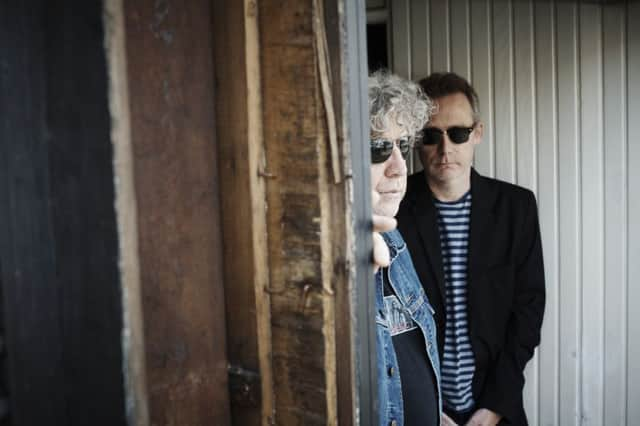Album reviews: The Jesus and Mary Chain | Depeche Mode | The Moonlandingz


POP
The Jesus and Mary Chain: Damage and Joy
ADA/Warner Music
****
Depeche Mode: Spirit
Columbia
***
The Moonlandingz: Interplanetary Class Classics
Transgressive
****
Trying to win your interest back but you ain’t having none of that,” goes the droll opening line of the first new The Jesus and Mary Chain album in almost 20 years. The song, Amputation, is a comment on their outsider relationship with the music biz but, frankly, they protest too much.
Only bands of a certain stature are offered big bucks to reform for California’s Coachella Festival, as the Mary Chain were in 2007 and, though it might sometimes feel otherwise, only a handful of artists command the kudos to revisit and tour a classic album, as the Reid brothers did with their feedback-drenched 1985 debut Psychocandy on its 30th anniversary.
Advertisement
Hide AdAdvertisement
Hide AdUntil now, however, there has been no recorded new music, despite all good intentions. The aim was to make a comeback album which is quintessentially Mary Chain. Thankfully, the long awaited Damage and Joy sounds much more natural than one might expect from an album which took nearly a decade to reach completion, with the freewheeling All Things Pass knocking around for much of that period.
The brothers chose to work with a producer for the first time ever, entrusting studio ace Youth with the task of keeping the quarrelsome pair in relative harmony and helping them apply a fresh coat of paint to their signature sound, which still sups from the evergreen rock and pop well of the Velvets, Bo Diddley, Lee Hazelwood and Phil Spector’s Wall of Sound, honouring the hard and soft in their style.
Amputation exemplifies the former, with that scuzzy chug of guitars and almost aggressive cooing backing vocals, while a handful of bittersweet boy/girl duets are dispensed with a lightness of touch.
War On Peace straddles the divide, evoking the mean, moody end of 1960s west coast psychedelia with its guitar reverb, vocal echo and the curt rattle of tambourine before revving up for its acid boogie coda.
Facing Up To The Facts is a particularly mean moan for sexual satisfaction though it’s tempting to seize on the line “I hate my brother and he hates me, that’s the way it’s supposed to be”. If so, it’s a dynamic which still works.
Martin Gore has always been a politically engaged writer and with ample provocation right now Depeche Mode’s new album Spirit is an often baleful, bleak examination of a global crisis of empathy. “We feel nothing inside,” intones a blank Dave Gahan, before making a robotic call for revolution. The music is (suitably?) cold and hollow, though things take a turn for the personal in the second half of the album and a hint of warmth creeps in on moody nuclear torch song Eternity and the vulnerable electro blues of Fail.
Life imitates art in the demented, entertaining form of The Moonlandingz, a northern garage band dreamed up by Leeds odd bods the Eccentronic Research Council to feature in their concept album Johnny Rocket, Narcissist and Music Machine about a stalker fan (played with relish by Maxine Peake), and then duly manifested in the real world with a little help from Lias Saoudi and Saul Adamczewski of Fat White Family.
Advertisement
Hide AdAdvertisement
Hide AdInterplanetary Class Classics is their suitably unhinged debut, a relentless beast fuelled by the darkly mischievous swagger of Iggy Pop and The Cramps, the glitter stomp of glam rock and the retro-futuristic soundscapes of vintage analogue electronica. In addition to all this tight-but-loose rock’n’roll action, they go full on 60s spy theme for Theme From Valhalla Dale and make a sci-fi prog rock splurge on This Cities Undone, with lashings of distorted guitar, wiggy synthesizers and demonic vocals from no less a fellow maverick than Yoko Ono.
CLASSICAL
Stravinsky: A Soldier’s Tale
Linn
****
This disc from the Royal Academy of Music Manson Ensemble under Oliver Knussen’s direction features work composed by Stravinsky and inspired by him. The centrepiece is Stravinsky’s Faustian A Soldier’s Tale, with actress Dame Harriet Walter as a characterful narrator, composer Sir Harrison Birtwistle as a sardonic Mancunian-accented Soldier, and George Benjamin as a charmer of a Devil. The musical performance is one of stinging clarity and incision, qualities that feature consistently in the selection of miniature Stravinsky tributes that also fill this disc. From the punchy, explosive burst of Stravinsky’s own Fanfare for a New Theatre and Peter Maxwell Davies’ elemental Canon ad honorem Igor Stravinsky and Canon in memoriam Igor Stravinsky, to Birwistle’s austere Chorale from a Toy Shop (2 versions) and his ghostly Tombeau in memoriam Igor Stravinsky, these are thoroughly refreshing performances, characteristic of Knussen’s cool and calculated directorial style.
Ken Walton
JAZZ
Chip Wickham: La Sombra
Lovemonk
****
Tonally and melodically elegant and with a distinct 1960s/1970s vibe without being cheesily retro, flautist-saxophonist Chip Wickham’s debut album comes after 25 years of working with other outfits, largely in his native Manchester. This album, however, was recorded in Madrid, with three fine local musicians – pianist Gabriel Casanova, David Salvador on double bass and Antonio Pax doubling on drums and vibraphone. The music is Wickham’s own, apart from an exuberant cover of the flamenco classic La Leyenda del Tiempo. Wickham’s tenor sax gives a meditative account of Tokyo Slow-Mo and spells out the melody with Pax’s vibes over funky bass in the racy Sling Shot, but it is his flute that really colours this recording. Combining aerial grace and attack, it drifts over shimmering vibes in Pushed Too Far, lets fly with breathy flute-singing in The Detour, while the similarly up-tempo Red Planet sounds like a joyful collision between Roland Kirk and Dave Brubeck.
Jim Gilchrist